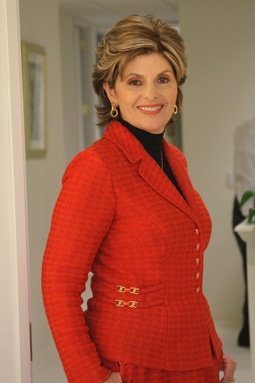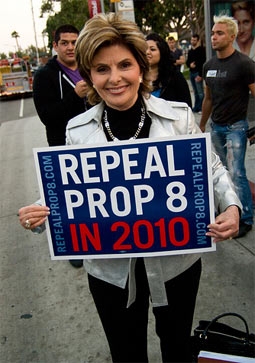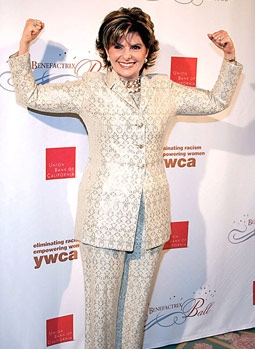
Gloria Allred and I sat down for a frank discussion about her three decade-long battle to protect, enforce and augment equal rights for women and other minorities in this country. Women who are embroiled in high-profile scandals and scuffles with the famous and powerful seem to flock to Gloria Allred for legal counsel. We see media clips of Ms. Allred as she ushers her headline-making clients through news conferences and into courthouses. I found this fascinating and wanted to know more.
As my meeting with Gloria Allred progressed, different adjectives began to run through my mind pertaining to the emotion behind her persona and her legal work. Words like serious, angry and wounded would then vacillate into strong, compassionate, and courageous. While editing this piece on Ms. Allred and pondering her words, there were a few moments where I found myself letting some uncomfortable laughter slip out, followed by sincere head scratching as I considered why she would be inclined to fight so vigilantly both in the public eye and in court for something that I feel I already have in spades. Equal rights with men, the ability to do as I please, and to accomplish what I wish is a privilege I have always taken for granted, and something I have always felt quite entitled to. Then another thought crept into my consciousness and grabbed hold of me. The thought echoed in my mind, “Be careful who you laugh at, for it is the ‘extreme’ and unreasonable people of this world who give you the ability to enjoy these rights and opportunities today.”
When we see people like Gloria Allred holding a press conference to bring attention to the plight of yet another client who has been wronged due to their gender, their sexual orientation or their socio- economic status, when we watch the Reverend Al Sharpton go after his latest prey and demand an apology for something that he views as a threat or slight to the African-American community, and when the Jewish Anti-Defamation League takes umbrage to a negative or false representation of the Jewish Community many of us are inclined to think, “Here we go again!”
Let us, for a moment, not forget that were it not for those who make fighting for these rights their life’s work, were it not for those who put themselves out on the front lines every day so the rest of us don’t have to, where would we be today?
Supposing there was never a Malcolm X, never female suffragists who sacrificed so profoundly to win women the right to vote. My own grandfather was in the United States Army’s Infantry Division, on foot in the front lines helping to liberate Europe from crimes against humanity perpetrated by Adolf Hitler against the Jewish people, and against other human beings whom he did not see as being of good Aryan stock.
It suddenly occurred to me that the fight for justice and for fundamental human rights does not end once a law is put in place, or a chapter in our history book has been closed. Gloria Allred is part of our Infantry Division. She takes the blows so we don’t have to.
PR.com (Allison Kugel): How do you find yourself at the center of so many high profile cases and media scandals? Do these clients seek you out or do you seek them out?
Gloria Allred: As a private law firm we do more women’s rights cases than any other private law firm in the nation. We have won hundreds of millions of dollars for victims of sexual harassment, of discrimination of all types, and we often represent women who have been the victims of injustice by men who often are rich, are powerful, are famous, and who betray the women in their lives. Women are aware that we are vigorous advocates for them. Every client that I have had in the last thirty-four years has contacted me.
PR.com: You often talk about “David and Goliath” cases. How does somebody win a David and Goliath case if they don’t have an attorney of your magnitude, if they don’t have Gloria Allred?
Gloria Allred: We work to equalize the power differential in women’s lives. I might add that we also represent men who are the victims of injustice, but we’re best known for representing women. It does take an enormous amount of strength and courage, and resources for women to win, and we work to make that happen.
PR.com: In the case of your client Rachel Uchitel, the woman who is alleged to have had an affair with Tiger Woods, why did she retain your legal services? Was their some imminent threat from the Tiger Woods camp?
Gloria Allred: She is my client. All I can say is that she has had no contact with Tiger Woods or any communication with him since she has been in Palm Beach, [Florida], and she hasn’t seen him in quite some time.
PR.com: Can you tell me why Rachel Uchitel’s press conference, which was scheduled for December 3, 2009, was abruptly cancelled?
Gloria Allred: No comment.

PR.com: Another client of yours, Vanessa Lopez, is suing Shaquille O’Neal for harassment. Generally speaking, what legally constitutes harassment?
Gloria Allred: It’s a fact-based case by case determination. I have to look at the facts that a client brings to me and then make a determination as to whether or not the law prohibits the conduct that has been described to me [by my client], by the alleged perpetrator.
PR.com: Do you take a client’s past conduct into consideration, or is all that matters what they are dealing with at the present moment?
Gloria Allred: With every client I like to know all of the relevant facts. Obviously, I can’t know all of the relevant facts for the future. It would have to be from the past (laughs).
PR.com: If you did, this would be quite an exclusive (laughs).
Gloria Allred: I’d have to have a crystal ball with me, and it would be worth quite a bit (laughs).
PR.com: Do you believe that someone who is wealthy and powerful can be victimized by someone who is not?
Gloria Allred: Yes. We have represented some celebrities, but generally we are representing non-celebrities against celebrities. Celebrities often will say that they are being victimized by the individuals who are suing them, and they come up with the standard, boring and unimaginative script-line that there is some kind of economic motive or criminal act that is being perpetrated on them.
PR.com: You don’t sound convinced.
Gloria Allred: It’s often not the case. Often they have hurt the non-celebrity and they have hurt them in a variety of ways. They are just rationalizing or engaging in spin to protect their own celebrity image rather than admitting, and taking responsibility for the wrong that they have inflicted on one of their employees, or someone with whom they’ve had an intimate relationship, or someone else in their life. So rather than acknowledging their personal responsibility and compensating the person whom they have harmed they will rationalize and try to make themselves the victim. It’s probably not something they are going to be able to defend in a court of law. But for the purposes of the court of public opinion they and their entourage will put that out in the public airwaves to try to sustain and maintain their own reputation.
PR.com: Do you think that power and celebrity corrupt one’s character?
Gloria Allred: I’m really not dealing with their character. I’m dealing with their PR image that they’re trying to spin to their advantage. I understand why they do that, but sometimes that’s going to bite them in the neck later on because they are unable to defend their actions in a court of law. They often have a bunch of “yes” people around them who are willing to do whatever the celebrity wants. Often, in the end, those same people end up getting fired, and sometimes those same people come to me to represent them against the celebrity (laughs). There have been many such cases. I know where all of the skeletons are buried in Southern California.
PR.com: Why have you chosen to try certain cases in the court of public opinion?
Gloria Allred: We don’t try cases in the court of public opinion. We assert our clients’ rights.
PR.com: Wouldn’t holding a press conference be trying a case in the court of public opinion?
Gloria Allred: We don’t ordinarily just do a press conference. We are doing something in addition to a press conference. We are doing a lawsuit and asserting a claim in some manner.
PR.com: That much I understand, but why in certain cases, in addition to trying a case in a court of law, also hold a press conference and put it out there in the media?

Gloria Allred: Filing a lawsuit is a public record open to anyone who wishes to view it. So if we are also doing a news conference in addition to the filing of a lawsuit, we are helping to put into context, and give a frame of reference to the lawsuit that is already on file and will be viewed by the public, and may be written about and discussed.
PR.com: Is it a way of leveling the playing field for your client, and giving them the same home- court advantage as the celebrity, so that once the lawsuit becomes public it’s a more balanced story?
Gloria Allred: I think providing a frame of reference does help to level the playing field.
PR.com: You, yourself, are very well known. How does that dynamic play out in court? How does it affect you with the opposing attorney, and with a judge and jury?
Gloria Allred: I think for the most part it’s helpful to my client. People know that I fight for those that might otherwise not have a voice, who might otherwise not be able to have an attorney to be a strong advocate for them to assert their rights, to vindicate their rights and to win their rights in a court of law. People know that I’m a fighter for change and that I want to remedy the injustice and win as must justice as is possible for them in a court of law. If it helps my client then I’m happy for it. If it doesn’t help my client, or if they don’t think it’s going to be helpful, they’ll be going somewhere else. On the other hand, there are not a lot of people who do what we do and do it with the record of success we have demonstrated.
PR.com: Where do you get your fight from? Where does the activist in you come from? You’re extremely passionate about fighting for the underdog and giving a voice to people who may otherwise not have a voice, and it seems that it goes beyond a professional pursuit and comes from someplace personal.
Gloria Allred: I do have a passion for justice and that does come from my own life experience. I grew up in a little row house in Philadelphia with parents who had an eighth grade education. My father was a door-to-door salesman. We never had a car, and we really had very little money, but I had a lot of love from my parents and a lot of support from them in terms of getting an education. Having been pregnant at nineteen, having been the victim of rape, having been a single mother who was unable to collect a court ordered child support, having had many experiences that many women suffer today, and more that I choose not to describe I can’t imagine not helping women. As a lawyer I’m in a relatively privileged position. I am able to help others. I learned in college how it is we go about making a moral choice. If one has the ability to help others, and if one has the desire to help others, then it’s the only moral choice to make. I can’t imagine not doing what I can to improve the condition and the status of women and minorities.
PR.com: Usually the person who’s being interviewed is supposed to tear up, but I’m tearing up.
Gloria Allred: I’m not here just to take up space on the planet. I’m here to help as many people as I can, using my education and my experience, and whatever resources I can bring to bear to empower them. And empowerment is what this is all about. It’s not about charity. It’s about rights, and it’s about helping people to recognize that they have more strength and courage to win justice than they ever realized they had.
PR.com: Do you have clients who keep in touch with you and let you know where their lives are now, and you feel that you played some role in affecting their future?
Gloria Allred: We had a victim of child sexual abuse who was thirteen years old when she came into our [office], wearing black and wanting to commit suicide. She’s given us the right to talk about her case. After we took her case and got the perpetrator of child sexual abuse sent to jail, and also sued him and were successful civilly, my daughter Lisa and I handled the case together, civilly, she wrote us a letter. It said, “Dear Gloria and Lisa, Thank you for giving me my life back.” She went on to become a leader against violence against women, and to also become a role model for other victims of sexual abuse. That’s an example of empowerment and turning it around so that a person becomes not just a victim, but a survivor and then a fighter for change. It’s not enough that we have rights, which many women have fought for and won at great personal cost and sacrifice to themselves and their families. If we have rights in the books we have to assert them, otherwise there is no point to having those rights just for them to get cobwebs. This afternoon I’m going to Federal Court here in New York, and it’s a very important case involving a young college student who alleged she was gang-raped by two other students and one of their guests at Dominican College, in New York. We allege in our lawsuit that the college did not do what they had a duty to do under the law to make her feel safe, and to accommodate her after she reported the allegation of rape. As a result she was afraid to go back to the college the next semester fearing that the perpetrators might still be there, and she ended up killing herself.
PR.com: And you are suing on behalf of the family?

Gloria Allred: We are suing on behalf of the estate of Megan Wright and we are representing her mother, Cynthia McGrath. I also called on the New York Attorney General to open an investigation into whether Dominican College had underreported the number of sexual assaults in their student handbook, which parents read and then determine if the campus is safe for them to send their children. The Attorney General did open an investigation and did find what we alleged. He entered into a settlement with Dominican College. They had to pay a certain amount of money, they had to engage in training of their personnel, and they will be monitored in the future. Most importantly, for the first time in the entire nation, the Attorney General sent a letter to every college and University in the state of New York indicating to them that the Attorney General’s office will consider it fraud if there is underreporting of crime statistics.
PR.com: This can be a precedent setting case.
Gloria Allred: As you were asking earlier about how people sometimes can’t even find an attorney to assert their rights, in the case of many victims of sexual assault on college campuses they don’t know they have any rights. If they know they have rights they don’t know where to go to assert them. If they do know to go to an attorney, they don’t know which attorney to go to or they can’t find one who will help them because they don’t have any money, because they’re college students. Often the college will go and continue their unlawful conduct at the expense of the victims of sexual assault, and then their educational workplace is not safe. We are very proud of our client. It takes a great deal of courage after she suffered this great tragedy of the loss of her daughter to pursue it, but she is doing so with us.
PR.com: If you do win this case how will it affect college campuses nationwide from this point on? What procedures will be put in place on college campuses for a student who alleges that she [or he] was raped or sexually assaulted?
Gloria Allred: I think colleges across the nation will watch this case very carefully. They’re already focusing on it because of the Attorney General’s findings and clear message on this issue, and because the college has filed a motion to dismiss all of our claims and the judge has denied their motion to dismiss even one of our claims. So the judge has permitted us to proceed to trial. We do think that colleges need to have a procedure in place to make the person who has made the accusation safe while at the same time they do an investigation which is thorough and which is fair. If, upon the conclusion of the investigation they believe that a crime has been committed, then they need to take appropriate disciplinary action against the perpetrators if those perpetrators are their students. In addition, they need to cooperate fully with the criminal justice system. And they must not defer their investigation until the criminal investigation is concluded. They have to do their own investigation concurrently with the criminal investigation. Even if there is no criminal investigation they still have a duty to do that.
PR.com: I want to talk to you about the term “feminism.” You wear it proudly; you call yourself a feminist. In recent decades it has gotten a bad name. Why do you think that is?
Gloria Allred: A feminist is a person who believes in legal, social, political and economic equality for women with men. To me, if a person is not a feminist, well the opposite of a person who believes in equality would be a bigot, would be a person who believes that woman should be subordinated and should be second class citizens. To me it’s like, you’re either pregnant or you’re not pregnant. There is no in between. You’re either a feminist who believes in equality, or you’re not. Why is it being given a bad name? Probably because some people don’t know what it is, so they jump to the wrong conclusions, or they’re against the concept of women enjoying equal rights with men.
PR.com: But you agree that there is a strange stigma attached to the term…
Gloria Allred: For some reason there is… even though the public policy of our nation is for equal rights for women there is a strong strain of patriarchy still existing among some people. Those people prefer to stigmatize those of us who wish to, and do, fight for equal rights for women. It’s as simple as that. Male chauvinism is, according to the American Psychiatric Association, a certifiable mental illness. But the good news is that it can be cured.
PR.com: Is that a joke or is that actually true?

Gloria Allred: It’s absolutely true. Male chauvinism is dangerous to a woman’s health. Most people would say that if people think that African Americans should enjoy a secondary citizenship status, that obviously that would be wrong! And it would not be a laughing matter. And yet, when [male] chauvinists somehow think that women should be subordinated and not enjoy equal rights, some people say, “Oh, that’s funny (feigning laughter). Could that really be?” Well, it’s not funny. It’s actually dangerous to a woman’s health.
(My above question was not meant to be flippant. I was not sure if that was dry humor on her part, or if she was relaying a bit of factual information. I have since looked it up, and sure enough, male chauvinism is considered a mental illness by the APA.)
PR.com: Because of what can result from it…
Gloria Allred: Because of what can result. For example, it looks great in the beginning. A woman has this fairytale image. “Prince Charming is going to come and take care of me for the rest of my life.” His constant attention is flattering to her and then later she finds out that this is dangerous. He’s isolating her. He won’t let her have her friends. Then he starts battering her in terms of her self esteem, and sometimes physically battering her as well. So it turns from, “Oh, how great this is!” to a dangerous situation that sometimes ends in her death.
PR.com: It is amazing to me how many women misinterpret that type of guy as being the “right” type of guy.
Gloria Allred: Women are socialized to believe the fairytale, [to believe] that Prince Charming will come. The truth is the women’s movement is about what if Prince Charming never comes? What if Prince Charming comes and leaves? Or, what if Prince Charming comes and turns into a frog? Generally, women end up rescuing the men in their lives, especially as the men get older. Women often end up becoming single mothers, taking full responsibility physically, emotionally and financially for their children while some of the deadbeat fathers avoid and escape their responsibilities. These are the stark realities that replace the fairytales. I deal with the realities of women’s lives, and not the fairytales, but with the disappointments that the fairytales did not come true.
PR.com: How do you make the distinction between [gender] discrimination, or simply a gender exclusive club or organization, whether it is male or female? For instance, if a group of women get together to just have a women’s group or a sorority, or if a group of men choose to have a fraternal organization? It’s ironic that we were supposed to meet at The Friars Club, when thirty years ago they didn’t let women in.
Gloria Allred: I’m the first woman member of the club.
PR.com: You’re the first woman member. You’re the one who changed that.
Gloria Allred: Yes, because I filed a complaint of sex discrimination.
PR.com: But when is it discrimination, and when is it simply, “We want to have a club that is just for men,” or “We want to have a club that is just for women.”?
Gloria Allred: Or a club that’s just for white people. It really depends on the facts. In many states and in many cities there are laws which govern when a club is a private club, and when a club is not a private club. The fact that a club calls itself private is not determinative on the issue on whether it is private or open to the public, and therefore subject to laws prohibiting discrimination. In the case of The Friars Club when they refused to allow me to have lunch there even though I was a Friar from Beverly Hills, and even though male Friars from the Beverly Hills club were permitted to have lunch at the New York club, I was not on account of my gender. I gave them an opportunity to change that policy and they declined my invitation. So I filed a complaint of sex discrimination and the Commissioner of Human Rights found that I was the victim of unlawful gender discrimination. After the Supreme Court of the United States upheld the New York City ordinance I called them on that same day and I said, “I’m in Los Angeles. Have you heard the United States Supreme Court decision?” They said, “Yes.” I said, “Can I have lunch there now?” and they said “No.” I asked if it was because I’m a woman, and they said “Yes.” I said, “I will be taking a red eye, and I will be flying from Los Angeles to New York tomorrow. I will be there at noon. Please have my table ready.” I flew all night to New York. I called a news conference, walked up to the New York Friars Club and as I was about to go in, comedian Henny Youngman tried to prevent my entrance into the club. There were also men at the windows, New York Friars, calling me by various genital parts of a woman.
PR.com: And these were esteemed men of high positions!

Gloria Allred: They weren’t esteemed as far as I was concerned (laughs). Mr. Youngman started making jokes and trying to prevent my entrance into the club, and I said to him, “Mr. Youngman, move aside. You are not going to stop progress for women.” As a famous comic he was not used to being told to step aside or do anything he didn’t wish to do. I gently moved him aside, went in, went to the Maître d’ and said, “As promised, I’m here for lunch. Is my table ready?” And he said, “Yes it is Ms. Allred.” With that I became the first woman member, and the first woman to ever have lunch at the New York Friars Club. When I had my first book signing I had it at the New York Friars Club and they have been wonderful to me ever since. The Dean of The Friars Club, Freddie Roman, came up to me at the book signing and said to me, “We did fight you, Gloria, but we have now accepted women as a result of your battle, and we want you to know it was the right thing to do. We are a stronger, more interesting, more vibrant club, and more financially stable,” (laughs) “as a result.”
PR.com: That also ties into what I said earlier about the media helping someone to level the playing field.
Gloria Allred: Allison, I have never felt that women should have to suffer in silence. It’s important to give voice and to bring a light to the injustices and the exclusion of women. Once light is shined on the problem, often the problem can be solved. It’s the old “the wheel that squeaks gets the grease.” I’ve often said, when people ask, “What do you want on your tombstone?” I think the best for me would be, “Here, we are all equal.”
PR.com: All of that being said, do you have any political aspirations?
Gloria Allred: None whatsoever. I have no political aspirations! I think we do need women on the inside and we need women on the outside. I’m a woman on the outside turning up the heat on those who are on the inside.
PR.com: What I really admire about you, and anybody who does what you do, is that you have the courage to not be afraid to not be liked. So many people are afraid to not be liked, and that’s why they don’t stand up for themselves.
Gloria Allred: Women have lost many rights because they are afraid of the displeasure of men, and because they are afraid of the risks which are inherent when one does not seek the pleasure of men. But there are costs to living in fear. The costs of living in fear are, in my opinion, often much greater than the cost of breaking out of that fear and taking action to win change in a woman’s life. We have to measure the risks versus the benefits in any particular action, and in any particular case. We do that all the time and the client decides, are they going to find the strength and courage to break out of that fear, or are they going to continue to live in it?
To learn more about Gloria Allred’s remarkable background and her landmark cases, visit gloriaallred.com, or visit the law offices of Allred, Maroko & Goldberg at amglaw.com.
